CCG's speeches at the book launch of "Escaping Thucydides’ Trap"
Speeches by Mabel Lu Miao, Co-Founder and Secretary-General of CCG, alongside Henry Huiyao Wang, Founder and President of CCG at the book launch event with Graham Allison
On March 22, 2024, the Center for China & Globalization (CCG) held a book launch event to release the English edition of the book "Escaping Thucydides’ Trap: Dialogue with Graham Allison on China-US Relations", published by Palgrave Macmillan, as well as its Chinese edition, published by CITIC Press Group. The book launch was followed by an engaging discussion between Henry Huiyao Wang, editor of the book & President of CCG, and Prof. Graham Allison, Founding Dean of the Harvard Kennedy School and former U.S. Assistant Secretary of Defense. This was their third collaboration within the CCG's Global Dialogue series, with the previous sessions held in April 2021 and March 2022.
Five days after the CCG event, Prof. Allison was welcomed by President Xi Jinping at the Great Hall of the People. During this meeting, Xi Jinping elaborated on the meaning of the phrase “You are in me, and I am in you,” a concept also acknowledged by Professor Allison in today's transcript. According to Xinhua, Allison told Xi that "The 'Thucydides's Trap' is not inevitable."
To ensure wide accessibility, CCG broadcasted the event live across various Chinese online platforms such as WeChat, Weibo, Douyin, Kuaishou, Baidu, and Bilibili. The video recordings of the event, both in English and Chinese, are available on YouTube and CCG's official WeChat blog.
Following the publication of Allison's speech, his dialogue with CCG President Henry Huiyao Wang, and a live Q&A session with the Chinese media, the CCG Update now offers a transcript of the presentations made by representatives from CCG. Featured are the speeches by Mabel Lu Miao, Co-Founder and Secretary-General of CCG, alongside Henry Huiyao Wang, Founder and President of CCG at the beginning of the session.
Mabel Lu Miao, Co-Founder and Secretary-General of CCG
Distinguished guests, ladies and gentlemen, good afternoon. Dear Professor Allison, Mr. Chen, and Mr. Dreyer. Good afternoon. Welcome to the Center for China and Globalization (CCG). Welcome to CCG's book launch event. Today we will release the book Escaping Thucycides' Trap: Dialogue with Graham Allison on China-US Relations in both Chinese and English. The Chinese edition is published by CITIC Press Group and the English edition is published by Springer Nature. Thucydides' trap is one of the most often cited concepts when discussing the China-U.S. relationship, particularly since the publication of Prof. Allison's book Destined for War: Can America and China Escape Thucydides' Trap in 2017. However, there's still a great deal of misunderstanding about its real argument and implications. The book Escaping Thucycides' Trap: Dialogue with Graham Allison on China-US Relations is based on Dr. Huiyao Wang's in-depth discussions with Prof. Graham Allison, Doctor Wang's research on Professor Allison's thoughts contained in the Belfer Center reports, as well as the articles and the interviews Allison has published, aiming to introduce the idea of Thucydides' Trap to a broader audience in an easily digestible format, address some misunderstandings about Professor Allison's argument, and find ways to avoid such war between China and the U.S.
Today, we are thrilled to celebrate with you all the launch of the Chinese and English editions of this book. I would like to take this opportunity to express my sincere thanks to CITIC Press Group, particularly Mr. Chen Wei, Chairman of the Board of Directors of CITIC Press Group, and Mr. Jiang Wenjun, Vice President of CITIC Press Group; and my sincere thanks to Springer Nature, particularly Jacob Dreyer, Senior Editor of Springer Nature. Their support was invaluable to the publication of this book. I would also like to extend my sincere thanks to our dear Prof. Graham Allison, who developed the concept of Thucydides' Trap and is the featured guest in this event for your support on the birth of this book.
Prof. Allison is an old friend of Doctor Wang and I. When we were in Harward - I was a visiting scholar at Fairbank Centre at Harvard and Dr. Wang was a senior fellow at Harvard Kennedy School from 2010 to 2011 - We met Prof. Allison at the time. Since then, we have been lucky enough to have many in-depth conversations with Prof. Allison on different occasions - at the Munich Security Conference, in Davos, in the headquarters of Beijing of CCG, and other different places - even when we visited Prof. Allison at the Kennedy School of Harvard. As an old friend of CCG, Prof. Allison also participated in CCG's online discussions, which were a part of the CCG's Global Dialogue Series. Other participants of the CCG Global Dialogue Series include Joseph Nye, Pascal Lamy, Thomas Friedman, and so on. We have published one book for Joseph Nye titled Soft Power and Great-Power Competition in both Chinese and English. Now we are very honored to publish Escaping Thucycides' Trap: Dialogue with Graham Allison on China-US Relations for Prof. Graham Allison. I remember that today is Professor Allison's second time visiting CCG headquarters. We are very honored to have him join us to release the book and give a speech. This book launch is hosted by CCG with support from CITIC Press Group and Springer Nature.
Henry Huiyao Wang, Founder and President of CCG
First of all, I'd like to, on behalf of CCG, welcome Professor Graham Allison, as well as Chairman Chen, Mr. Jacob Dreyer, Harvard alumni, journalists, policymakers, and many distinguished guests and scholars to come to CCG. We're very pleased to welcome all of you and this is a very exciting moment. I shall use some slides to demonstrate what the book is actually about. The book is titled Escaping Thucycides' Trap: Dialogue with Graham Allison on China-US Relations. Its Chinese version is 《跨越修昔底德陷阱:王辉耀对话格雷厄姆艾利森-论中国与世界》.
The book we are releasing today is a heavyweight publication by CITIC Press Group, a well-known publisher in China. It comes out at a crucial time amid uncertainties and even crises in China-US relations, addressing how to overcome the Thucydides’ Trap. On October 9, 2023, President Xi Jinping held a meeting with the bipartisan delegation of the U.S. Senate, led by Chuck Schumer, at the Great Hall of the People. During the meeting, President Xi pointed out that "the China-U.S. relationship is the most important bilateral relationship in the world. How China and the U.S. get along will determine the future of humanity." This underscores the historical and global significance of the issues discussed in this book. President Xi also remarked, "The 'Thucydides Trap' is not inevitable, and Planet Earth is vast enough to accommodate the respective development and common prosperity of China and the U.S." The publication of this book is timely and aims to foster new perspectives and consensus between China and the U.S., contributing to global peace and prosperity.
Aside from that, President Xi Jinping has emphasized on numerous occasions that China-US relations are the most important bilateral relationship in the world. My friend, Prof. Allison, after extensive research, identified the potential for conflict arising between emerging and existing powers if such relationships are not carefully managed. His seminal work, "Destined for War: Can America and China Escape Thucydides's Trap?", serves as a compelling and provocative examination of the risks posed by the relationship between these two nations. It garnered widespread international attention and discussion.
President Xi Jinping has repeatedly stated, "There is no such thing as the so-called Thucydides trap in the world. But should major countries time and again make the mistakes of strategic miscalculation, they might create such traps for themselves." With the evolving geopolitical landscape and the emergence of the Global South, the trade conflict between China and the US has gradually extended into fields such as technology, including the semiconductor industry. This book is based on years of dialogue between Professor Allison and me, as well as my study of his latest work—I believe it is imperative to compile his latest thoughts and recommendations and reflect them through dialogue.
How to transition from "being trapped" to "leaping forward" is a crucial agenda for the new era. The purpose of identifying traps is to "avoid" them, which is crucial. Allison also mentioned the importance of avoiding strategic misjudgments and sliding into war.
Today marks the global launch of this book in both Chinese and English for the first time, with Prof. Allison himself present at CCG. It's fair to say that this book has garnered significant attention.
We have engaged in various dialogues with Prof. Allison. In March 2019, which was already five years ago, Prof. Allison participated in a roundtable discussion at CCG. The following year, at the Munich Security Conference, CCG, as the only Chinese partner permitted to host side events, invited John Kerry (former US Secretary of State and Climate Envoy), Fu Ying (former Deputy Chairwoman of China's NPC Committee on Foreign Affairs), and Prof. Allison to discuss how China and the U.S. could establish mechanisms for cooperation. We discussed many aspects of finding common ground, including climate change. In both 2023 and 2024, Prof. Allison furthered these discussions by delivering keynote speeches at the Munich Security Conference, examining the potential for expanded cooperation between China and the U.S., and later between China, the US, and Europe—the most important trilateral relationship in the world. How to maximize the leading role of these three largest economies has always been of great concern, all of which are related to Thucydides’ Trap.
During the pandemic, our engagement with Prof. Allison continued to be robust. We held two dialogues, each lasting between one and two hours, focusing on exploring avenues for coexistence between China and the U.S. and resolving tensions in major power relations. Last summer, we visited Harvard specifically to meet with Prof. Allison and had an in-depth discussion with him in his office at Harvard Kennedy School .
The need for enhanced cooperation and communication between China and the U.S. is imperative, requiring sustained momentum. The contents of this book are extensive, covering topics such as China-US relations and the geopolitical competition between the two countries, the rejuvenation of China, U.S. foreign policy, U.S.-USSR relations, U.S.-Russian relations, global geopolitics, nuclear proliferation, the Korean Peninsula issue, the COVID-19 pandemic, and future technology. It explores pathways to avoid conflict between China and the U.S. across various domains, including finance, technology, economy, military, and diplomacy. Our dialogue was candid and constructive, offering many suggestions that are inspiring for avoiding Thucydides’ Trap.
Allow me to introduce the chapters of the book. Thanks again to the two internationally renowned publishers—CITIC Press Group and Palgrave Macmillan.
The opening chapter, "Thucydides’ Trap Revisited," introduces the "big idea"—the basic premise of the "Thucydides’ Trap." It poses several detailed questions: How did Thucydides understand the causes of the Peloponnesian War? What does Thucydides teach us about the distinction between proximate and structural causes? What is the "Thucydides' Trap"? What does historical experience tell us about the danger of Thucydides's Trap? What relevance does the Thuycydudes' Trap have to U.S.-China Relations in the 21st century?
Chapter Two, "Tectonic Shifts," reviews the structural changes in China-U.S. relations and the shifts in power dynamics within the international system in the five to six years following the publication of the previous book, "Destined for War." The focus is on identifying pathways toward a future where China and the United States coexist, instead of engaging in conflicts, in the era of globalization. The questions this chapter poses include: Is China "rising" or "risen"? What is the significance of China's success in poverty alleviation? What lessons can be drawn from this program? How do you describe the overall structural trend of the U.S.-China relationship? What has happened to the relative power of the United States and China since the U.S. Victory in the Cold War? How is the rising China impacting the U.S.?
In terms of economic competition: Why should we pay attention to economic measures Like GDP in understanding the rivalry between the U.S. and China? What is the relationship between economic strength and power? How has the relative balance between the GDP of the US and China changed in recent decades? Given these challenges, why should we expect China to remain in solid growth?
In terms of financial competition: Is the position of the U.S. dollar as the world's reserve currency unassailable? How much progress has been made in the internationalization of the RMB? What do China's advances in digital currency and fintech mean for the dominance of the U..S dollar? What does China's economic rise mean for Asia and the rest of the world?
In terms of technological competition: How do you compare the overall technological strength of the U.S. and China? Is tech competition between the US and China necessarily a bad thing? What are the relative strengths of the two countries in the field of green energy?
In terms of military competition: Doesn't the U.S. spend more on defense than China? What do China's advances in space exploration and technology mean for its military competitiveness?
In terms of diplomatic competition: How do you assess the changes in the balance of diplomatic strength between the U.S. and China? And their soft power – we have just published a book by Joseph Nye about soft power.
We also discussed the future of international order: If unipolarity is over, what replaces it? What does it mean for the U.S.'s role in the world? Despite their intense rivalry, why are the U.S. and China "condemned to co-exist"?
Chapter Three probes deeper into the question of whether the U.S. and China are "destined for war": Is war between China and the U.S. Inevitable? Could China and the U.S. be sleepwalking toward war and stumbling down the path Germany and the United Kingdom took at the beginning of the last century? In what ways are the U.S. and China similar to each other? In what ways are they fundamentally incompatible? What does the war in Ukraine mean for U.S.-China relations? This chapter acknowledges the presence of risks - how wars begin and the potential sparks for a U.S.-China conflict, e.g. Taiwan - while highlighting that neither side desires conflict.
Chapter Four presents proposals and historical precedents for navigating beyond these risks. Where should we start if we want to avoid a war between the U.S. and China? What kind of mindset is needed if we are to escape Thucydides' Trap? What is "Applied History" and how can it help us avoid war? What can we learn from Henry Kissinger about how to use Applied History? This chapter also endeavors to redefine the U.S.-China relationship, drawing upon instances from Chinese, American, and Cold War histories, to explore the possibility of the U.S. and China competing and cooperating at the same time.
Additionally, I have written an afterword, which is aptly named "Beyond Thucydides’ Trap." It extends the discussion to other potential traps in China-US relations and incorporates alternative examples from Chinese history.
Competition and cooperation are commonplace, yet the key lies in effectively managing the dynamic between them. As Prof. Allison often says, Apple and Samsung simultaneously compete and collaborate within the smartphone market. In the electric vehicle industry, Tesla and CATL share a similar dynamic. Netflix and Disney both cooperate and compete. The economic domain abounds with examples where competition and cooperation coexist. Therefore, "co-petition" is the word.
In Chinese history, the Zuozhuan recounts a rivalry between Jin and Chu in the Spring and Autumn Periods (770–476 BC). The story demonstrates how the two rival countries jointly faced challenges without disrupting the contemporary international system. There are many similar discussions in the book, so I won't dwell further on them.
It is indeed exciting to have editors, experts, and journalists gathered together to discuss how to escape Thucydides’ Trap and how to build a new model of major-country relations. Once again, I extend my gratitude to Prof. Allison, CITIC Press Group, and Palgrave Macmillan. Now, let us listen to Professor Allison's speech. But first, allow me to formally introduce him. Graham Allison is the founding dean of Harvard's John F. Kennedy School of Government. He also served as the director of the Belfer Center for International Affairs and Scientific Research. Having studied at Harvard myself, I am well aware of the prominence and influence of these two institutions. He is the author of Destined for War: Can America and China Escape Thucycidides' Trap (2017). Also, he wrote a book about Lee Kuan Yew: the Grand Master's Insights on China, the United States, and the World (2013) - coincidentally, CITIC Press Group has just reprinted this book. We are very actually very fortunate to have Graham coming so long way - I mean, he just arrived last night. I know he has given a talk this morning and that he'll be here for a few days. Today, his presence at CCG fills us with great joy.
Of course, Graham is not only an academic; he also served as an Assistant Secretary of Defense and advised the Secretaries of Defense and every President from Reagan to Obama, so he is surely very knowledgeable. He has many students in the U.S. Department of Defense. And I know Harvard's Kennedy School has trained many talents worldwide. So it's really a great pleasure for CCG and all of us to welcome Graham to have his speech. Let's welcome Graham.





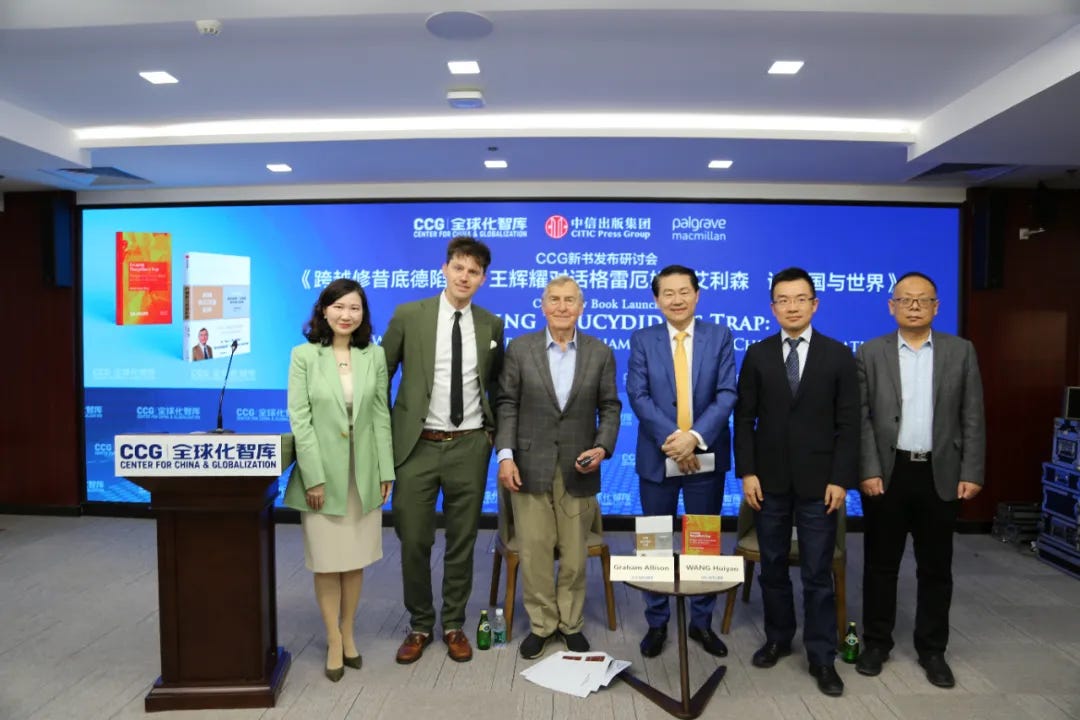
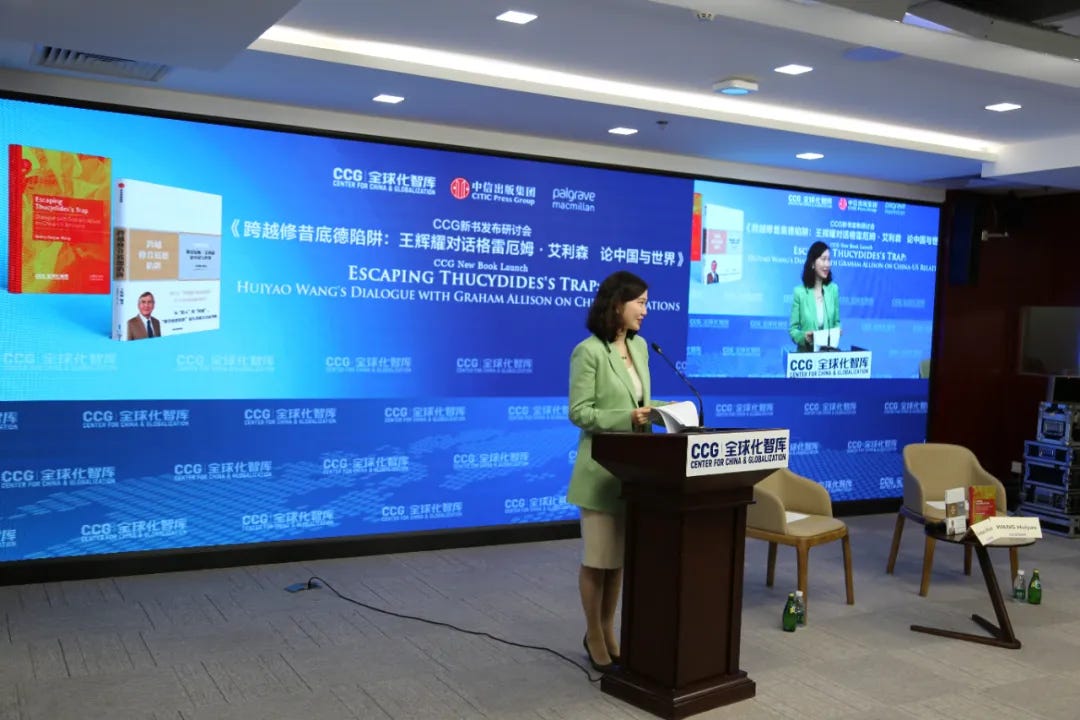
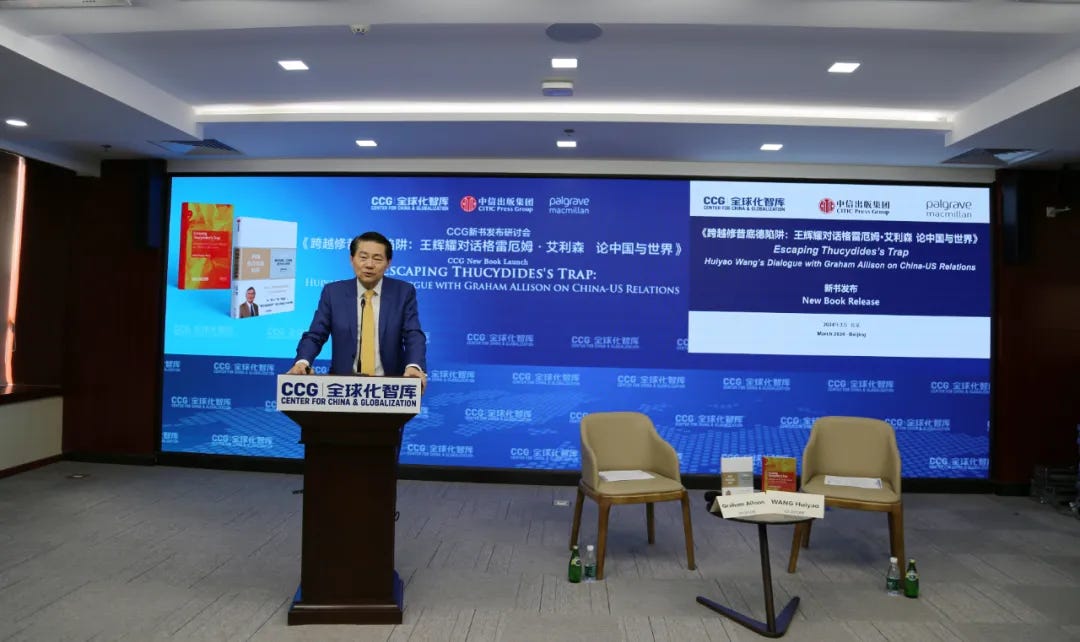
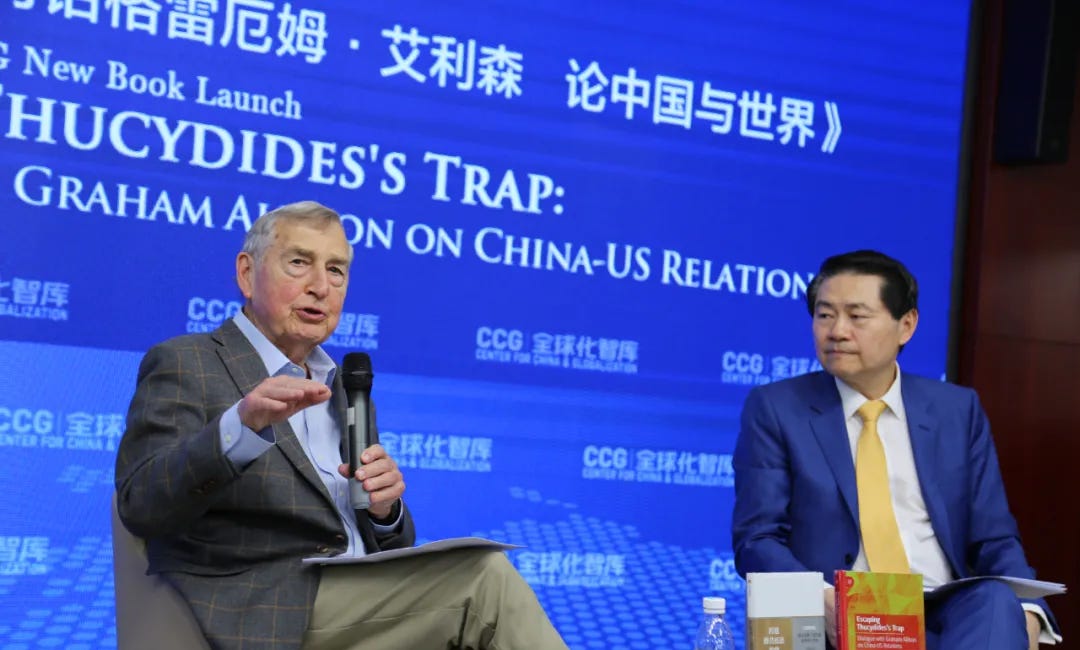
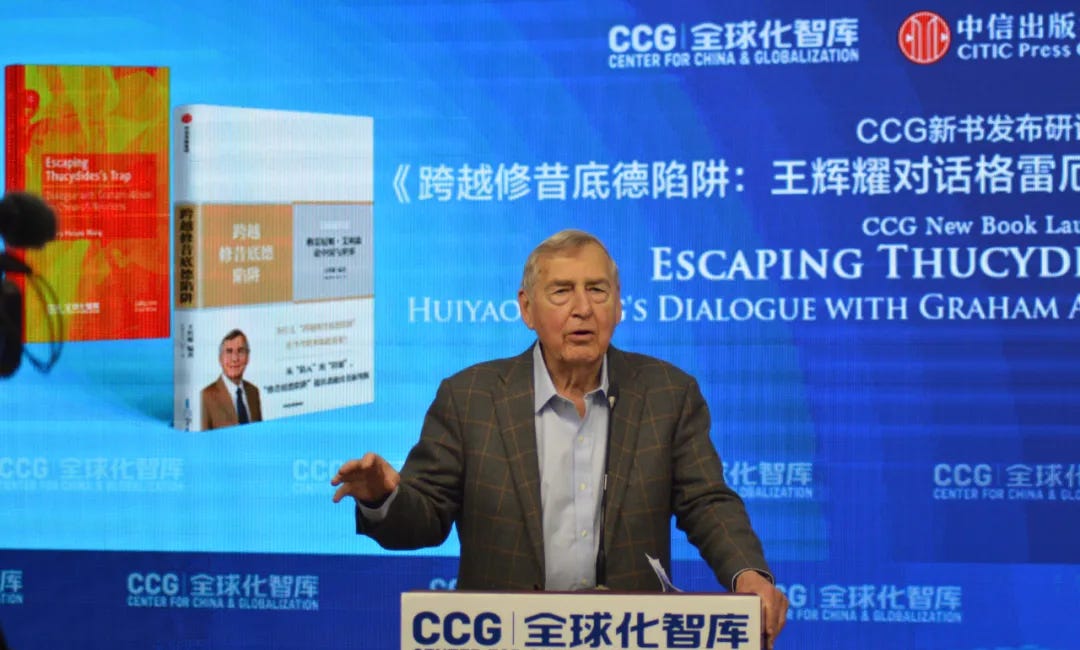
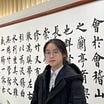
Generate a speech script for the book launch event at the Center for China and Globalization (CCG) introducing the book "Escaping Thucycides' Trap: Dialogue with Graham Allison on China-US Relations." The speech should include acknowledgments to CITIC Press Group, Springer Nature, and Professor Graham Allison for their contributions to the publication. Highlight the significance of Thucydides' trap in the context of China-US relations, clarify any misunderstandings about the concept, and express gratitude to the participants and supporters of the event.